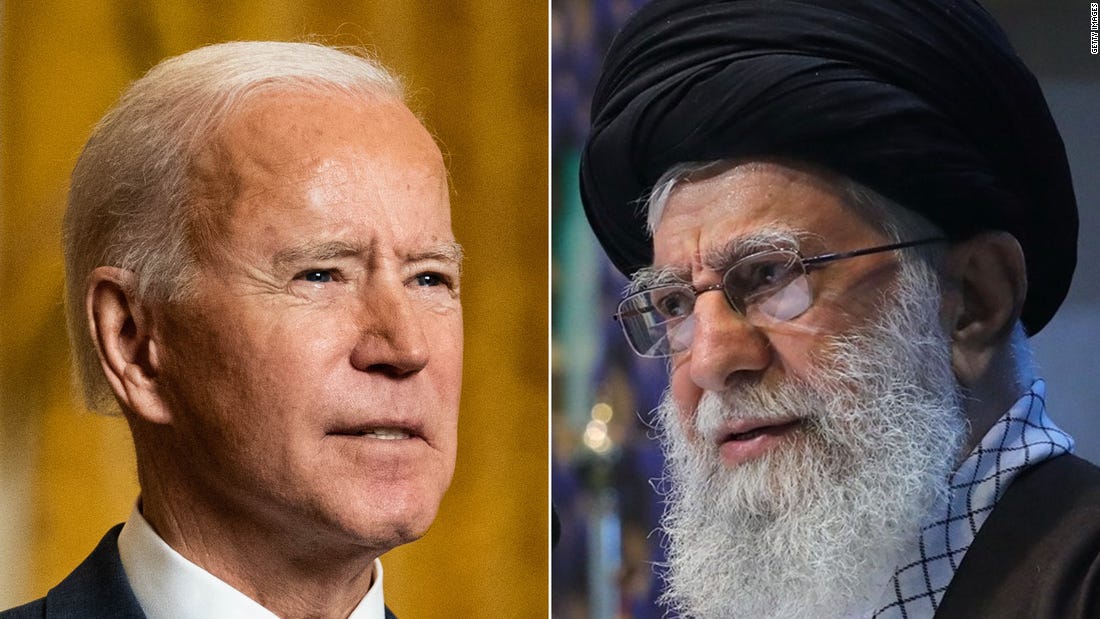Biden's Failure to Deter
Rising threats & waning deterrence dominate the Biden administration's foreign policy challenges
‘Our capacity to retaliate must be, and is, massive in order to deter all forms of aggression.’ - John Foster Dulles.
Over the last two years, Joe Biden has confronted an unsettling reality that has hindered his presidency — the words he speaks mean nothing to America's adversaries. His rhetorical support for upholding democracy and resolute opposition to authoritarians contrasts the actual policies implemented by his administration. Worse, the ignominy surrounding his Afghanistan withdrawal not only inflicted a blow to national pride but also began a concerning erosion of the credibility of the United States.
America's self-inflicted humiliation seldom yields a positive outcome. Thus far, Mr. Biden has been unsuccessful in dissuading Vladimir Putin from advancing into Ukraine, is left with lingering concerns about the potential for a Chinese incursion into Taiwan, and has made only modest efforts to discourage Iran and its proxies from launching assaults on U.S. forces and their allies. With Hamas and Hezbollah, acting upon the directives of their benefactors in Tehran, commencing terrorist attacks and war against Israel, the world anticipates the response of the United States.
The Biden administration's approach to Iran and its supreme leader, Ayatollah Ali Khamenei, is notably bereft of a projection of strength and instead appears to invite weakness and peril. In the aftermath of the attack, Mr. Biden sought to project an image of steadfastness as he cautioned other nations against intervening in the Israeli conflict with a single word: "don’t." However, conspicuously absent from his address was any attribution of responsibility to Iran, a deliberate omission likely driven by the fear of their policy of accommodation toward Khamenei coming under intense scrutiny.
In September, the Biden administration reached an agreement with Iran, wherein the United States secured the release of unjustly detained U.S. citizens in exchange for a substantial sum of $6 billion paid to Iran. This transaction, effectively purchasing six American hostages at an approximate cost of one billion dollars each, establishes a worrisome precedent. It is estimated that Hamas currently holds numerous American hostages, most likely with the expectation of a comparable ransom for their liberation. Buying hostages encourages more hostages to be taken, particularly given the billion dollar price placed on each American passport.
Secretary of State Antony Blinken defended the $6 billion settlement by asserting that the funds in question could not be employed against Israel, as they have been held in custody by Qatar. However, as any accountant knows, money is inherently fungible. Iran astutely anticipated Mr. Biden's willingness to pay, and their coordination with Hamas commenced as early as August, coinciding with Iran's diplomatic negotiations with the United States.
Both Mr. Biden and Mr. Blinken have dedicated their tenures to negotiation with Tehran, exhibiting a pronounced inclination toward revising the nuclear deal. Mr. Biden deviated from stringent enforcement of oil sanctions, leading to a notable boost in Iran's revenues. When sanctions were rigorously imposed in previous years, Iran's oil production was a meager 400,000 barrels per day. With Mr. Biden's relaxation of sanctions, Iran has surged to an output of 3.5 million barrels daily, with projections indicating future output of 4 million barrels daily. In 2021, Iranian oil sales to China alone garnered $23 billion in profits for Tehran.
As Mr. Biden imposed stringent regulations to curtail domestic U.S. energy production, he inadvertently enabled Tehran to capitalize on oil revenue at the expense of American companies. Tehran has evidently exploited the $40 billion in generated revenue to arm Hamas, Hezbollah, and Russia’s war in Ukraine. Whatever grievances the political left may harbor against Exxon, Chevron, and Philipps 66, it is better for them to profit than a terrorist regime.
Concerning the notion of deterrence, Mr. Biden has dispatched an imposing task force, comprising two aircraft carriers, two Ticonderoga-class cruisers, and seven Arleigh Burke-class destroyers, in an endeavor to project American military might. The U.S. Navy presence presents a formidable spectacle, but its efficacy hinges largely on the perception of the President's willingness to use it. Mr. Biden's resolve to employ American military force appears hesitant at best.
It is imperative for Mr. Biden to leverage this task force to mete out retribution against these aggressors. Should Hamas execute any American hostages, the President should direct the navy to execute precision missile strikes against their positions in Gaza. Moreover, he must hold Iran culpable for the loss of captives' lives.
Iran has functioned as a rogue state with impunity, evading consequences for far too long. Mr. Biden should contemplate targeted operations against Iran's oil fields, nuclear facilities, and military installations, severely crippling their capacity to finance and orchestrate these acts of terrorism. Iran demonstrates little concern for the casualties that may befall Hamas and the citizens of Gaza, but a retaliatory strike on their own homeland may well provoke a reconsideration of their actions. Absent a credible threat of American military force, Iran will persist in funding and escalating this conflict, placing countless innocent lives, including Americans, in grave jeopardy.



